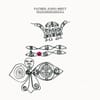No One Does Ego Death Like Father John Misty
On ‘Mahashmashana,’ Misty’s main-character-syndrome folk-rock uncovers shiny new pearls of wisdom.

People love to hate the singer-songwriter Father John Misty, but in some cases I’m not sure they’ve actually listened to his music. Instead, they hate the idea of Father John Misty, which in certain circles was codified as king-daddy indie troll at the height of the identity politics era, in the mid-to-late 2010s. Ever self-aware, the man himself surmised this phenomenon well when we spoke in 2017: “Basically, I think that the culture needs to deal with this smug, ironic white-guy thing. It’s like liberals have now whittled down and self-perverted to nothing. You’re not allowed to be.” Josh Tillman had earned his place in the millennial prestige cringe-art hall of fame, right next to Lena Dunham, with creepy-satirical lines like “in bed with Taylor Swift, every night inside an Oculus Rift.” But he was also penalized for his omnipresence—for taking up space and taking the piss within an earnest indie rock realm that was finally moving away from cis dudes with strong opinions.





